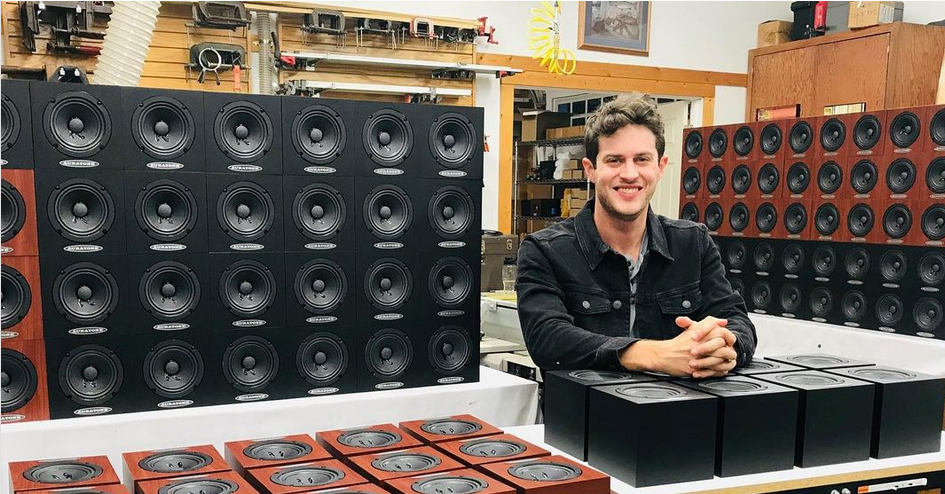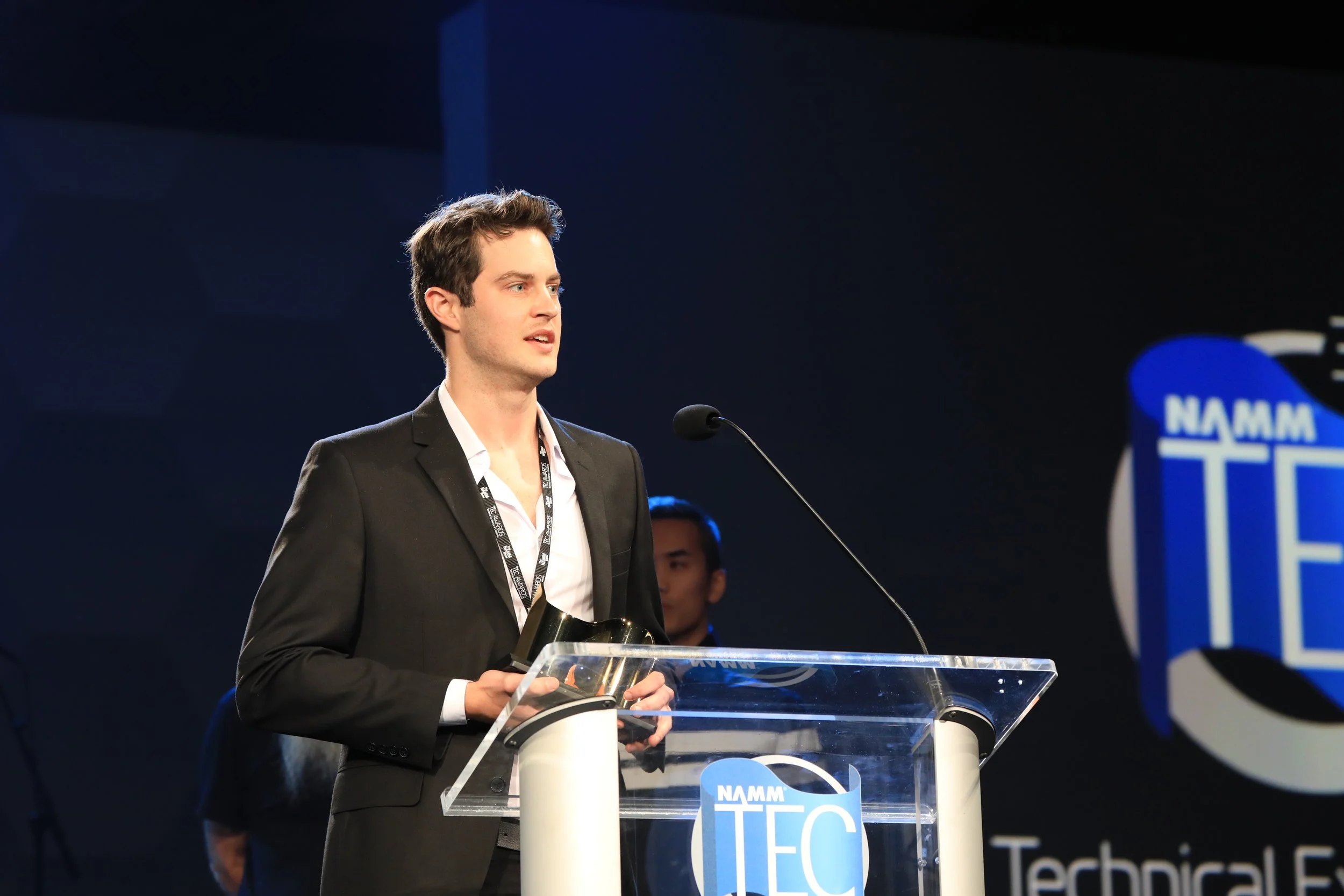Alex Jacobsen mixes it with the best
_
President
Auratone LLC
_
President
Auratone LLC
I love to get out and see the world. I’ve lived and worked in South Africa, and have travelled through Europe, Asia and the Middle East, Central America, Australia and New Zealand. Closer to home, I recently rode a motorbike across the United States from Tennessee to the Pacific North West. I love to challenge myself and to get the most out of life. You’ve probably seen me doing a few fun things on Instagram … hiking up mountains, mountain biking, skiing, snowboarding, surfing, white water kayaking, freediving, and sky diving.

You love travel and adventure, but we also know that you love home. What does Nashville mean to you?
Nashville – widely known as both ‘Music City USA’ and the ‘Songwriting Capital of the World’ – has been my home for over 10 years. Music isn’t just part of the culture here: music is the culture. Country music evolved in the basement studios of Music Row, on the stages of the Ryman Auditorium and the Grand Ole Opry, and in the performances of thousands of musicians from legends such as Dolly Parton and Johnny Cash to the hopefuls who continue to flock into the city today. But Nashville isn’t just about country. It also has strong traditions in jazz, bluegrass, R&B, rock and even gospel, and artists such as the Kings of Leon, the Black Eyed Peas, Bon Jovi, and Sheryl Crow have come here to record. For someone who loves music, it’s a fantastic place to be. I also love hockey [Ed: that’s ice hockey for Australians], and get out to see the Nashville Predators when I can.

You’ve re-built a family business, a business with a great history, back into one which distributes its products globally. Has that been rewarding?
I’m really proud of what my grandfather achieved, and the place that he holds in the history of the music industry. After he passed away, the business lost quite a bit of inertia, but I’ve been driven to revive and build on his legacy. I’ve made sure to incorporate as much as possible from his time in the company – even using drills, artwork and test equipment from those days.
I’m pleased to say that AURATONE is once again a leading name in the industry, and that we’ve built on my grandfather’s legacy by designing and manufacturing new products, such as an award-winning amplifier. We now have a worldwide distribution network which covers over 30 countries around the world, including Australia.
Can you tell us a little bit about the AURATONE Sound Cubes? Why were they so revolutionary?
Although my grandfather originally designed his loudspeakers for home use, they became famous during the 1970s for being ‘real world’ reference monitors in the recording industry. When mixing music in sophisticated recording studios, sound engineers have always had access to expensive loudspeakers which produce high-quality sounds across the entire frequency spectrum from the ‘bass’, through the ‘mids’ and up to the ‘highs’. However, back then, consumers usually played their music on car stereos and home speakers which would have a much more limited range and lower quality sound.
The AURATONE speakers produce high-quality-sound in the mid-range of the frequency spectrum – the critical part where consumer equipment reproduced most of their sounds. This enabled sound engineers to hear aspects of the music that they might otherwise miss when they’re listening to the music on pro speakers. A good mix will sound good on an AURATONE Sound Cube, but a bad mix will sound very obviously bad. Although car stereos and home hi-fi equipment are much better now than back then, the need for great reference monitors is still there because consumers listen to their music on equipment such as computers, ear buds, and portable Bluetooth speakers.
Your grandfather was quoted as saying that he would never sacrifice quality for quantity. Is that also true for you?

Definitely. I’d also add that we never sacrifice quality for speed and turnaround either. When I was building the first modern version of the AURATONE 5C Sound Cube, I poured over box after box of my grandfather’s drawings and specs. I learned that the speakers were actually pretty simple in design, but they’re really hard to build because they rely on quality components. I spent a good two years finding modern manufacturing techniques and sourcing new suppliers in the USA. I carefully tested hundreds of combinations of the components, all the while looking to synthesise a product that had sound quality at least as good as the vintage models, and which I could reliably reproduce again and again.
It would have been much quicker and cheaper to launch the next generation models if we manufactured overseas, but we couldn’t get the same quality by doing that. A lot of AURATONE imitators have sprung up over the years, but they’ve never got it right because they don’t focus on quality the same way that we do. We hold ourselves to the highest standards because these are AURATONE speakers … they’re not knock-offs!

The AURATONE brand is a huge part of your business. What legal challenges have you faced relating to that brand?
Yes, our brand is crucial. Having a great product is absolutely essential, but we need people to know that when they buy a product from us, that product has a particular heritage and a particular promise of quality. These things are signified by the word AURATONE.
In 2014, a huge multi-national conglomerate applied to register the name ‘AURATONE’ in relation to speakers in the United States. They had no rights to the name, but with thousands of employees, and revenues in the hundreds of millions of dollars every year, they had the ability to fight. That began a seven-year legal battle which ended by the US District Court ruling in our favour. It was a real ‘David and Goliath’ battle, and I became heavily involved in the case. In fact, I worked so much on the case that my US lawyer once told me to give her a call if ever wanted to become a lawyer!
In the intervening years, that company started selling a poor‑quality cube-shaped speaker under the name ‘AURATONE’. The copycat looked identical to our product and was clearly designed to make people think they were the genuine article. They also filed applications to register trade marks in other places around the world, including Australia.
Could you explain to our readers how Epiphany Law has helped you?
Sure. Although we had a big win in the United States in 2021, intellectual property laws operate on a country-by-country or region-by-region basis, and so we’ve been fighting our competitor in different countries all around the world. Australia is an important market for us, and we needed Epiphany Law to help us to protect our IP over there. First, IP Australia had accepted a couple of applications by our competitor to register a couple of trade marks for the word ‘AURATONE’. We needed help to oppose the registration of those marks, and Epiphany Law did that successfully for us. Secondly, we needed to register our own trade mark in Australia, and Epiphany Law secured a registered trade mark for us, overcoming objections from IP Australia in the process.
What do you look for in your lawyers?
I look for a few things when I’m choosing my lawyers. I obviously need to work with lawyers who are experts in their field, and who can hold their own against the best. We are thorough and have a relentless focus on quality. We think carefully about our products, and I want our lawyers to do the same when they’re advising us.
I co-ordinate a network of lawyers in different countries, and my IP lawyers need to understand the overall picture, and to think about how their advice fits in with the global strategy.
A few years ago, one of my American lawyers told me that clients tend to find lawyers that reflect their own values and personalities, and I’ve come to believe that’s true. It’s really important to me that I’m working with people who value human relationships. AURATONE is a globally famous brand, but at our core we’re still a family business. We want to work with people who care about our businesss, and who don’t just treat us like another number.
